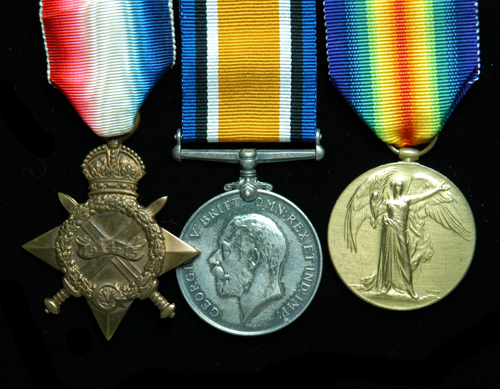
Auction: 7012 - Orders, Decorations, Medals & Militaria
Lot: 842
A Second Battle of Ypres Killed of Action Group of Three Lieutenant J.A.C. ´Laddie´ Inglis, Highland Light Infantry 1914-15 Star (Lieut. J.A.C. Inglis. High. L.I.); British War and Victory Medals (Lieut. J.A.C. Inglis.), nearly extremely fine (3) Estimate £ 200-250 Lieutenant James Arthur Chetwynd Inglis, born Edinburgh, 1883; educated Edinburgh Academy, Cargilfield, and Eton; aged 17 Inglis enlisted in the City of London Imperial Yeomanry ("The Rough Riders") and served with them during the Boer War campaign (entitled to Q.S.A., five clasps); on his return to England he was gazetted Second Lieutenant 4th (Militia) Battalion Highland Light Infantry; entered the Cambourne School of Mines, Cornwall, passing out first in Metallurgy and Assaying, and later was elected a Student of the Institute of Mining and Metallurgy; resigned commission 1911, and travelled in Australia, North and South America before settling in Tahiti; Inglis was residing in the latter with the outbreak of the Great War, he travelled back to England immediately and was gazetted Lieutenant with his old battalion, October 1914; served in the French Theatre of War attached to the 1st Battalion Seaforth Highlanders, from March 1915; he joined the battalion only a matter of days before he was killed in action, 9.5.1915, close to Port Arthur, Neuve Chapelle, his Colonel wrote, "He fell at about 5.40am., when gallantly leading his platoon in an attack on the German trenches" These were found to be bristling with machine guns and the barbed-wire entanglements in front still in tact, so that the regiment lost very heavily; in fact it, as well as several other regiments, was almost annihilated. "In the assault of Sunday, the 9th May, the 1st Seaforths were on the left, the 4th Seaforths in the centre, and the 2nd Ghurkhas on the right. The attack had been postponed twenty-four hours, and as our men were advancing the Germans were shouting, ´Come on, come on! You are twenty-four hours late!´ showing that spies had been at work with the information. The Prussian Guards were supposed to be occupying the trench in front of the 1st Seaforths. The bombardment of the German trenches was to commence at 5 a.m. Our Artillery was to spend fifteen minutes wire cutting, then lift to the first-line enemy trench throwing shrapnel for ten minutes. Then at about 5.30 the bombardment was to be lifted from the German first-line to their second-line trench, when our first charge was to be made by ´B´ and ´C´ Companies, ´A´ and ´D´ Companies being in support. Lieutenant Inglis was in command of one of the platoons of ´D´ Company. While waiting in the support trench before the bombardment had commenced, Lieutenant Inglis was very cheery, joking and laughing with his men in order to keep up their spirits. At 4.30 he gave his final instructions to his sergeant-major, telling him to bring up the rear of the platoon, as he himself would be in front, and he asked his lance-corporal if his men had their bombs quite ready. At about 5.20, after the bombardment had started, one of the officers of ´B´ Company came down the trench wounded, and Lieutenant Inglis bandaged him up. The fire trench, to which the company had now moved up, was crowded with men. Some were carrying boxes of bombs and some shovels and flags; others were setting ladders in position against the parapet. Mixed with the noise of our artillery could be heard the firing of the German Maxims and rifles repelling the attack of our leading companies, who were being mowed down. Then word was given to fix bayonets, and at 5.30 came the order, ´Company D, over the parapet!´ Many of the men fell while lining up at the edge of the parapet. The platoon commanded by Lieutenant Inglis advanced about eighty yards across ground that looked as if a giant plough had been over it, and where lay the dead and wounded of our leading companies. They charged the barbed wire twice, but our Artillery had failed to destroy it, and the men could not get through. All this time they were subjected to a terrific fire from the enemy, shells of all sorts, and machine-gun and rifle fire. Some of our wounded who fell near the German trenches had petrol bombs thrown at them as they lay on the ground, which set their clothes on fire and exploded the ammunition in their belts. While lying down after the second charge, Lieutenant Inglis bound up the wounds of a man next to him who was hit by a piece of shell. Almost immediately afterwards he himself was shot through the head, death being instantaneous." Lieutenant Inglis had a great admiration for his men and was beloved by them. The Sergeant of his platoon wrote: "He had only been with us a short time, but we had learnt to love him." And his Men: "He was one of the best officers we ever had. We all respected and thought very highly of him and feel his loss keenly. We would have followed him anywhere." His Colonel and brother Officers "deeply regretted the loss of a good comrade and capable soldier." (The Bond of Sacrifice, Vol. II, refers). Lieutenant J.A.C. Inglis is commemorated on the Le Touret Memorial, Pas de Calais, France.
Sold for
£260




